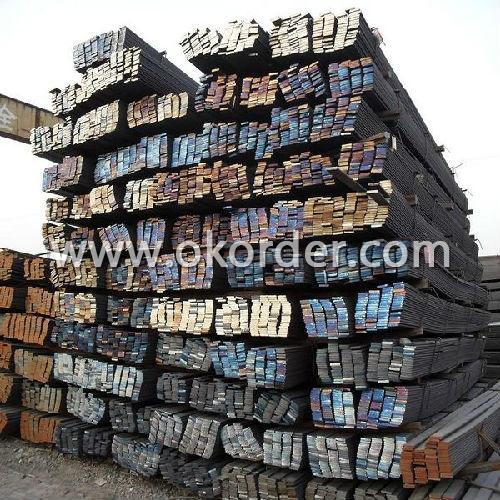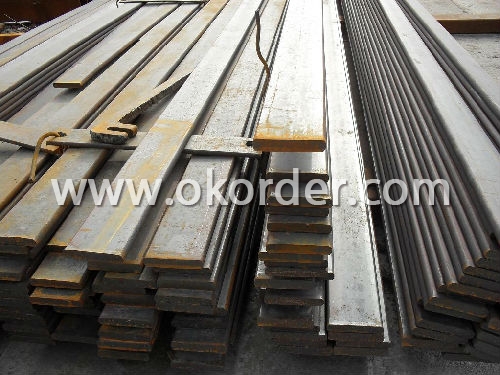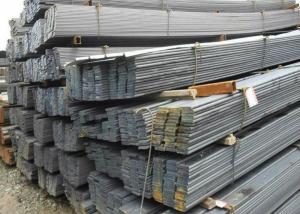Flat Spring Steel
- Loading Port:
- China Main Port
- Payment Terms:
- TT or LC
- Min Order Qty:
- 50Tons m.t.
- Supply Capability:
- 600000/YEAR m.t./month
OKorder Service Pledge
OKorder Financial Service
You Might Also Like
Spring Steel can be divided into two types. One is carbon spring steel, and other one is alloy spring steel.
Alloy spring steel is based on carbon spring steel, by adding one or more alloying elements to improve the mechanical properties, hardenability and other properties to meet the requirement for manufacturing all kinds of spring steel.
Specification of Flat Spring Steel:
-Material: 55Si2Mn
-Production: Hot rolled or cold rolled
-Standard: GB/T 1222-1984
-Type: Spring Steel
-Alloy or no: Alloy
Chemical Composition:
C | Si | Mn | S |
0.52~0.6 | 1.500~2.00 | 0.60~0.90 | ≤0.035 |
P | Cr | Ni | Cu |
≤0.035 | ≤0.35 | ≤0.35 | ≤0.25 |
Mechanical Properties:
-Tensile Strength σb (MPa): ≥1274(130)
-Yield Strength σs (MPa): ≥1176(120)
-Elongation δ10(%): ≥6
-Percentage reduction of area: ψ (%): ≥30
-Hardness:
1, Hot rolled, ≤302HB
2, Cold drawn + Heat treatment: ≤321HB
Usage/Applications of Flat Spring Steel:
-Elements Si and Mn improve elasticity strength, hardenability, and the ratio of yield point and tensile strength. but the decarburization tendency is a little large,
-55Si2Mn Spring Steel can be used as vibration damper leaf spring and spiral spring of cars and tractors.
-Heat-resisting spring below 250 degrees.
Packaging & Delivery of Flat Spring Steel:
-Packing Detail: The products can be packed in bundles by steel wires.
-Marks:
1, Tag marks: the tag marks will be tied up to each bundle of the products. The information is usually including supplier’s logo and name, product name, made in China, products’ specifications, the painted color and other information requested by customers.
2, Color marks: we will paint both ends of the bundles of these products to make sure that they are more evident. It’s will be more convenient for the customers to distinguish them at the destination port.
-Delivery Detail:
1, Delivery time: 30~45 working days after receive buyer’s T.T. or L/C.
2, Delivery status should be written in the contract. (Heat treatment or no)
Payment:
-Invoicing on theoretical weight or actual weight as customer’s request.
-FOB, CFR or CIF.
-Regular terms of payment:
1, 30% payment in advance, the remaining balance (70% payment) against the copy of B/L. 100% payment before shipment.
2, 30% payment in advance, the remaining balance (70% L/C) against the copy of B/L. 100% payment before shipment.
3, Negotiable.
Photos of Flat Spring Steel:


- Q:What are the main applications of special steel in the power generation sector?
- Special steel is extensively used in the power generation sector for various critical applications. Some of the main applications include turbine blades, rotors, and casings, which require high strength, heat resistance, and corrosion resistance. Additionally, special steel is used in the construction of power plant boilers, pressure vessels, and piping systems, ensuring efficient operation and long-term durability. Furthermore, it finds application in the manufacturing of electrical components such as generators, transformers, and transmission lines, where its superior electrical conductivity and magnetic properties are crucial. Overall, special steel plays a vital role in enhancing the performance, reliability, and safety of power generation equipment and infrastructure.
- Q:How does special steel compare to other high-performance materials?
- Special steel stands out from other high-performance materials due to its exceptional strength, durability, and versatility. It exhibits higher tensile strength compared to materials like aluminum, titanium, and composites, making it suitable for robust and load-bearing applications. Moreover, special steel excels in resisting corrosion, heat, and wear, making it a perfect choice for harsh environments and high-temperature uses. One advantage of special steel is its cost-effectiveness, making it more affordable than materials like titanium. This affordability makes it the preferred choice in various industries. Additionally, the manufacturing process allows for customization, enabling the production of different grades and compositions to meet specific requirements. Special steel's excellent machinability and weldability make fabrication and assembly easy. Its versatility allows it to be utilized in various industries, including automotive, aerospace, construction, and energy. Whether it's structural components or precision tools, special steel provides a reliable and efficient solution. However, it's important to consider that the choice of material depends on the specific application and its requirements. While special steel has numerous advantages, there may be instances where other high-performance materials are more suitable, such as lightweight components or extreme temperature conditions. Therefore, conducting a comprehensive evaluation of the application's needs and characteristics is crucial in determining the most appropriate material.
- Q:What are the different forging grades of special steel?
- In the market, there exists a variety of forging grades for special steel, each possessing its own distinctive characteristics and applications. Among the most frequently utilized forging grades are: 1. Carbon Steel: Noted for its exceptional strength and durability, carbon steel is a favored option for forging. Its hardness and toughness are determined by the varying levels of carbon present. Carbon steel forgings find widespread usage in the automotive, construction equipment, and machinery industries. 2. Alloy Steel: By incorporating diverse alloying elements, such as manganese, chromium, nickel, or molybdenum, into carbon steel, alloy steel is created. This augmentation enhances its strength, corrosion resistance, and wear resistance. The aerospace, defense, oil and gas, and power generation sectors extensively employ alloy steel forgings. 3. Stainless Steel: Stainless steel, an alloy resistant to corrosion, contains a minimum of 10.5% chromium. It boasts remarkable resistance against rust and staining, rendering it suitable for applications in harsh environments or where hygiene is of utmost importance. Stainless steel forgings are commonly employed in the food processing, chemical, and medical industries. 4. Tool Steel: Tailor-made for utilization in cutting tools, molds, and dies, tool steel exhibits high hardness, wear resistance, and toughness, enabling it to withstand elevated temperatures and heavy loads. Tool steel forgings are utilized in the production of drills, saw blades, punches, and an array of precision tools. 5. High-Speed Steel: High-speed steel, a specific type of tool steel, retains its hardness even when employed at high speeds. It incorporates additional elements such as tungsten, molybdenum, or vanadium, which enhance its resistance to heat and wear. High-speed steel forgings are employed in the production of cutting tools, drills, and milling cutters. 6. Maraging Steel: Maraging steel, a low-carbon, high-nickel steel alloy, is renowned for its extraordinary strength and toughness. Through heat treatment, it achieves high tensile strength while maintaining good ductility. Maraging steel forgings find extensive application in the aerospace, defense, and missile systems industries. These aforementioned examples merely represent a selection of the diverse forging grades of special steel available in the market. Each grade proffers distinct properties tailored to specific applications, ensuring the appropriate material can be chosen to meet desired performance and durability requirements.
- Q:How is special steel used in the manufacturing of industrial machinery?
- Special steel is used in the manufacturing of industrial machinery due to its exceptional properties such as high strength, durability, and resistance to corrosion. It is commonly utilized in components like gears, shafts, bearings, and tooling, as it can withstand heavy loads, high temperatures, and harsh working conditions. By using special steel, manufacturers can ensure the reliability and longevity of industrial machinery, enhancing overall performance and productivity.
- Q:How does special steel contribute to the power generation equipment industry?
- Special steel plays a crucial role in the power generation equipment industry by providing exceptional strength, durability, and corrosion resistance. It is extensively used in the manufacturing of turbines, generators, and other critical components, ensuring their reliable performance under extreme conditions. Special steel's high temperature and pressure resistance make it ideal for power plants, enabling efficient energy conversion and minimizing downtime. Additionally, its ability to withstand harsh environments and resist fatigue and wear extends the lifespan of power generation equipment, reducing maintenance costs and enhancing overall productivity in the industry.
- Q:What are the applications of special steel in the power generation manufacturing process?
- Special steel is widely used in the power generation manufacturing process due to its exceptional properties. It is utilized in various applications such as turbine blades, boiler tubes, and heat exchangers. The high strength and temperature resistance of special steel enable it to withstand the harsh conditions in power plants, ensuring reliable operation and increased efficiency. Additionally, its corrosion resistance properties help maintain the integrity of components, extending their lifespan and reducing maintenance costs. Overall, the applications of special steel in power generation manufacturing play a crucial role in enhancing the performance and durability of power plant equipment.
- Q:What are the specific requirements for special steel used in the textile industry?
- The specific requirements for special steel used in the textile industry are primarily related to its durability, corrosion resistance, and heat resistance. Due to the harsh conditions and high temperatures involved in textile processing, the steel used must be able to withstand these conditions without compromising its structural integrity. Firstly, the steel used in the textile industry must possess excellent durability. It should be able to withstand high mechanical stress, including tension, compression, and bending, without experiencing deformation or breakage. This is important as the machinery in the textile industry undergoes constant movement and repetitive actions. Corrosion resistance is another crucial requirement for special steel in the textile industry. The steel should be resistant to corrosion caused by chemicals, moisture, and other environmental factors. This is especially important as textile manufacturing processes often involve the use of various chemicals and water. Heat resistance is also vital for special steel in the textile industry. As the manufacturing processes involve high temperatures, the steel used must be able to withstand and maintain its strength and properties under these conditions. This ensures the longevity and efficiency of the equipment and machinery used in textile production. Additionally, the steel used in the textile industry should have excellent machinability. It should be easy to cut, shape, and form into various components and parts required for textile machinery. This allows for efficient manufacturing and customization of equipment as per specific needs. Furthermore, the steel may also need to meet specific standards and certifications set by regulatory bodies or industry organizations, ensuring that it meets the necessary quality and safety requirements. For instance, it may need to comply with international standards such as ISO 9001 for quality management systems. In summary, the specific requirements for special steel used in the textile industry include durability, corrosion resistance, heat resistance, machinability, and compliance with relevant standards. Meeting these requirements ensures that the steel can withstand the demanding conditions of textile manufacturing and contribute to the efficiency and reliability of the machinery involved.
- Q:How does special steel perform in terms of machinability?
- Special steel typically has good machinability due to its composition and specific manufacturing processes. It is often designed to have improved cutting and chip formation properties, allowing for easier and more efficient machining operations. This allows manufacturers to achieve high precision and productivity when working with special steel, making it a favorable choice for various applications.
- Q:What are the main advantages of using special steel in the aerospace industry?
- The main advantages of using special steel in the aerospace industry are its high strength-to-weight ratio, excellent corrosion resistance, and superior heat and wear resistance. These properties make special steel ideal for constructing aircraft components that need to withstand extreme conditions, such as high temperatures, pressure, and stress. Additionally, special steel offers excellent fatigue resistance, ensuring the longevity and reliability of aerospace structures.
- Q:How is special steel used in the manufacturing of bearings?
- Special steel is used in the manufacturing of bearings due to its high strength, durability, and resistance to wear and corrosion. This type of steel is specifically designed to withstand the demanding conditions and loads that bearings are subjected to. It is used to create the inner and outer rings, as well as the rolling elements, of the bearing, ensuring smooth operation and increased lifespan.
1. Manufacturer Overview |
|
|---|---|
| Location | Jiangsu, China |
| Year Established | 2003 |
| Annual Output Value | Above US$ 30 Million |
| Main Markets | Asia-Pacific; Middle east |
| Company Certifications | |
2. Manufacturer Certificates |
|
|---|---|
| a) Certification Name | |
| Range | |
| Reference | |
| Validity Period | |
3. Manufacturer Capability |
|
|---|---|
| a)Trade Capacity | |
| Nearest Port | Shanghai. |
| Export Percentage | 20% - 30% |
| No.of Employees in Trade Department | 10-20 People |
| Language Spoken: | English; Chinese |
| b)Factory Information | |
| Factory Size: | Above 100,000 square meters |
| No. of Production Lines | 2 |
| Contract Manufacturing | OEM Service Offered; |
| Product Price Range | Average |
Send your message to us
Flat Spring Steel
- Loading Port:
- China Main Port
- Payment Terms:
- TT or LC
- Min Order Qty:
- 50Tons m.t.
- Supply Capability:
- 600000/YEAR m.t./month
OKorder Service Pledge
OKorder Financial Service
Similar products
New products
Hot products
Hot Searches
Related keywords





























